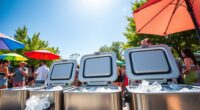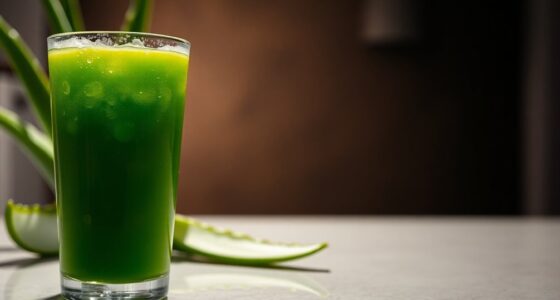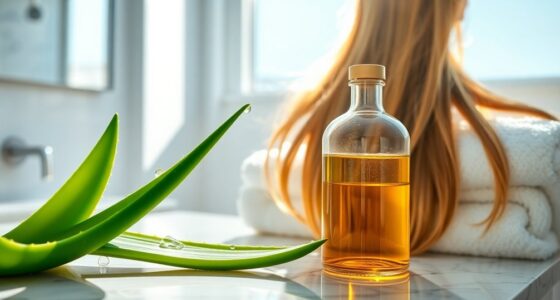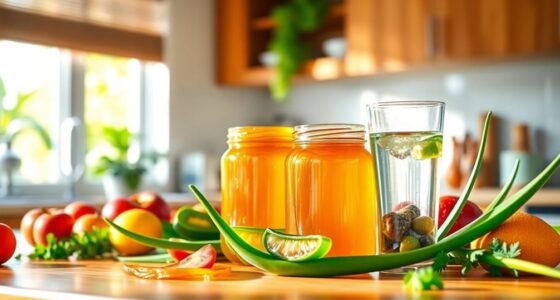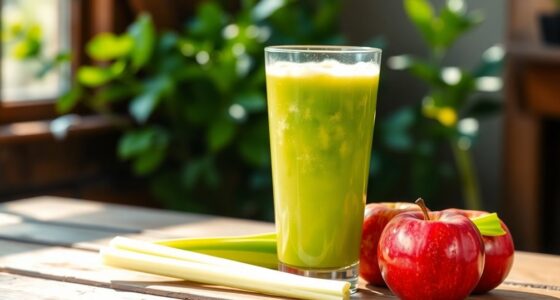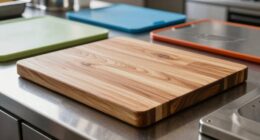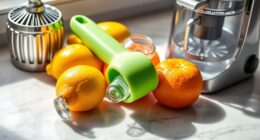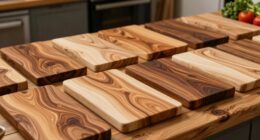To boost grilling safety quickly, start by keeping flammable materials like paper and leaves away from your grill. Inspect your equipment and area before each use, making certain everything’s clean and in good condition. Use proper lighting and ensure good ventilation, especially when grilling at night or in enclosed spaces. Always wear protective gear and never leave the grill unattended. Managing flare-ups swiftly and having a fire extinguisher nearby can prevent accidents—more tips await if you keep exploring.
Key Takeaways
- Inspect and clean your grill, hoses, and connections before each use to prevent leaks and fire hazards.
- Ensure the grilling area is well-ventilated, properly lit, and free of flammable materials.
- Never leave the grill unattended; stay alert to manage flare-ups and ensure safety.
- Wear protective gear like gloves and flame-resistant clothing to avoid burns and accidents.
- Keep a fire extinguisher nearby and handle charcoal or propane safely to respond quickly to emergencies.
Keep a Safe Distance From Flammable Materials
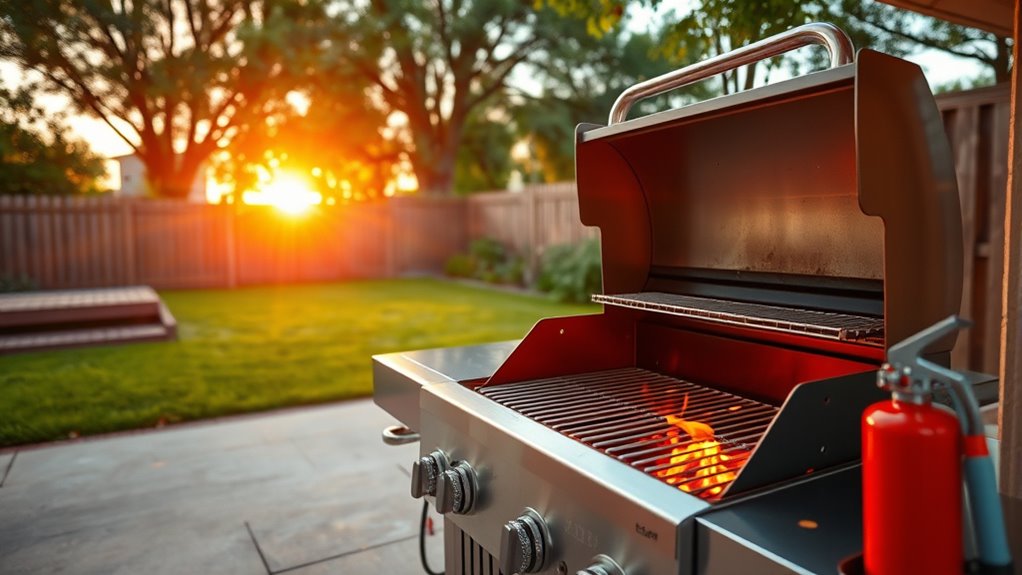
To prevent accidents, always keep your grill away from flammable materials such as dry leaves, paper, and wooden structures. Maintaining a safe distance is vital to avoid fires and guarantee safe grilling. Flammable materials can ignite easily if they come in contact with heat or sparks, so you should position your grill at least a few feet away from them. Clear the area around your grill, removing any leaves, paper, or other combustible items. This simple step markedly reduces the risk of flare-ups or uncontrolled fires. Remember, a safe distance not only protects your surroundings but also helps you monitor your grill better, preventing accidents before they happen. Staying vigilant about the placement of your grill is a quick, effective safety measure. Additionally, ensuring proper ventilation can prevent dangerous gas buildup and improve overall safety during grilling.
Check Your Grill Before Use
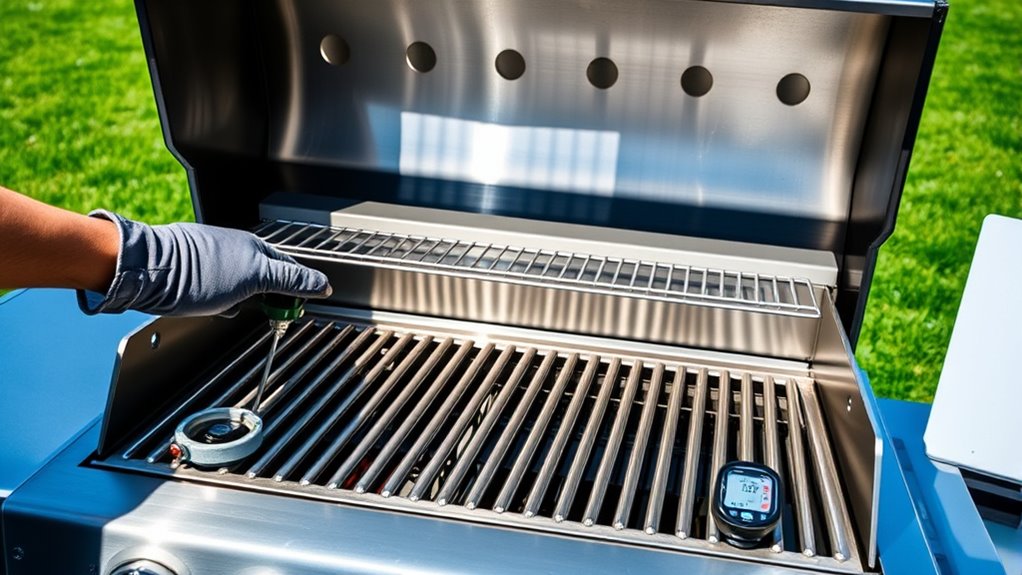
Before firing up your grill, it’s essential to give it a thorough check to guarantee everything is in proper working order. Proper grill maintenance and equipment inspection help prevent accidents and ensure safe operation. Start by inspecting hoses and connections for leaks, cracks, or corrosion. Clean out grease buildup and check that burners ignite properly. Ensure the propane tank valve is closed before connecting and open it slowly afterward. Examine the grill grates for rust or damage and replace if necessary. Confirm all safety features, like thermometers and shut-off valves, are functioning correctly. Taking these small steps reduces the risk of flare-ups, gas leaks, or fires. A quick pre-use check keeps your grilling safe and enjoyable, so don’t skip this vital step. Additionally, regularly maintaining your grill can extend its lifespan and improve overall safety.
Use Proper Lighting and Ventilation
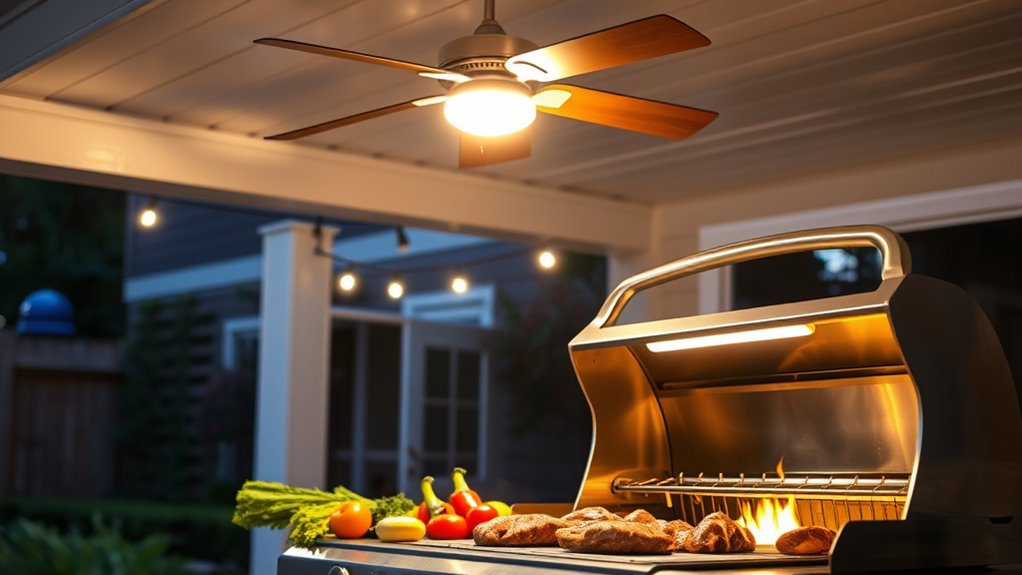
Make sure your grilling area is well-lit so you can see what you’re doing and avoid accidents. Good lighting also helps you monitor food and flames more effectively. Additionally, guarantee there’s enough airflow to prevent smoke buildup and keep the grill working safely. Proper ventilation is essential to ensure fire safety and prevent hazardous conditions.
Ensure Adequate Illumination
Ensuring proper illumination is essential for safe grilling, especially as darkness falls or when working in dimly lit areas. Adequate lighting helps you see flames, hot surfaces, and tools clearly, preventing accidents. Invest in bright, weatherproof lights or headlamps to enhance visibility. Good lighting boosts your confidence and focus, reducing risks of burns or fires. Consider this emotional impact:
| Feel confident | Prevent accidents | Enjoy peaceful grilling |
|---|---|---|
| Stay safe during night grilling | Spot hazards instantly | Savor every moment outdoors |
| Illuminate your space | Keep loved ones protected | Create memorable experiences |
Visibility enhancement isn’t just practical; it’s a crucial step toward safer, more enjoyable grilling. Proper illumination transforms your experience from risky to secure. Using appropriate lighting solutions can further improve safety and visibility during your grilling sessions.
Maximize Airflow Efficiency
Good lighting is only part of creating a safe grilling environment; proper ventilation is equally important to keep the air flowing and prevent dangerous buildup of smoke and gases. Focus on ventilation design that promotes airflow optimization around your grill area. Ensure there’s enough space for fresh air to enter and for fumes to exit freely. Position your grill in a well-ventilated spot, avoiding enclosed spaces or areas with poor airflow. Use adjustable vents or windows to control airflow, reducing smoke accumulation and harmful gas exposure. Good ventilation not only improves safety but also enhances grilling comfort. Regularly check that vents aren’t blocked, and consider adding fans if needed to boost airflow. Proper airflow management is a quick, effective way to elevate your grilling safety. Additionally, using portable camping fans can significantly improve airflow in outdoor grilling setups, ensuring a safer and more comfortable cooking experience.
Wear Appropriate Clothing and Protective Gear
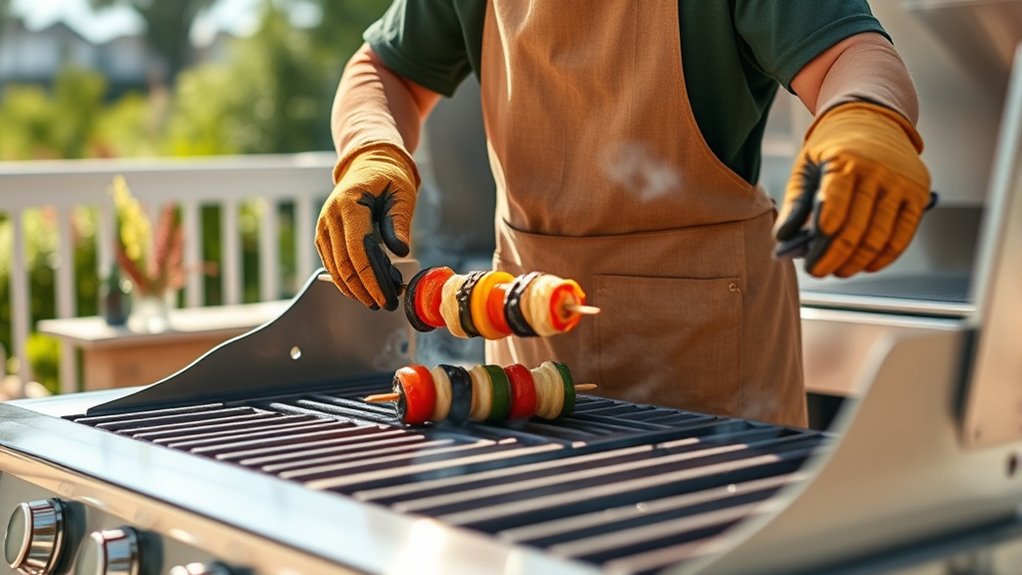
Wearing flame-resistant clothing and safety gloves can prevent serious injuries while grilling. These protective items keep you safe from unexpected flare-ups and hot splatters. Make sure you gear up properly before you start cooking to stay protected. Using protective styling techniques can also help keep your clothing and accessories in place, reducing the risk of accidents.
Wear Flame-Resistant Attire
When you’re grilling, choosing flame-resistant attire is essential for safety. Wearing protective grilling gear minimizes the risk of burns from unexpected flare-ups or sparks. Opt for flame-resistant shirts and pants made from durable materials that won’t ignite easily. Avoid loose clothing that can catch fire or dangle into the flames. To help visualize, here’s a quick overview:
| Clothing Item | Material | Purpose |
|---|---|---|
| Flame-resistant shirt | Nomex or Kevlar blend | Protects against sparks |
| Durable apron | Fire-retardant fabric | Shields torso and legs |
| Heat-resistant gloves | Kevlar or leather | Safeguards hands from burns |
| Long pants | Thick, flame-resistant fabric | Prevents leg burns |
| Closed-toe shoes | Leather or heat-resistant material | Protects feet from hot embers |
Investing in protective gear keeps you safe and confident while grilling. Additionally, proper maintenance of your gear ensures it remains effective during use.
Use Safety Gloves
Protecting your hands during grilling is just as important as wearing flame-resistant clothing. Safety gloves help prevent burns and injuries when handling hot tools or food. Using heat resistant gloves allows you to manage flames and hot surfaces confidently, while disposable safety gloves keep things sanitary and protect against grease or splatters. Always choose gloves that fit well and are rated for heat resistance. Celebrity lifestyle insights reveal how even the smallest precautions contribute to a safer, more enjoyable grilling experience.
- Wear heat resistant gloves when flipping or removing food from high heat
- Use disposable safety gloves to prevent cross-contamination
- Replace gloves if they become torn or damaged
- Keep a pair of gloves nearby for quick access during grilling
Maintain a Clean Cooking Area
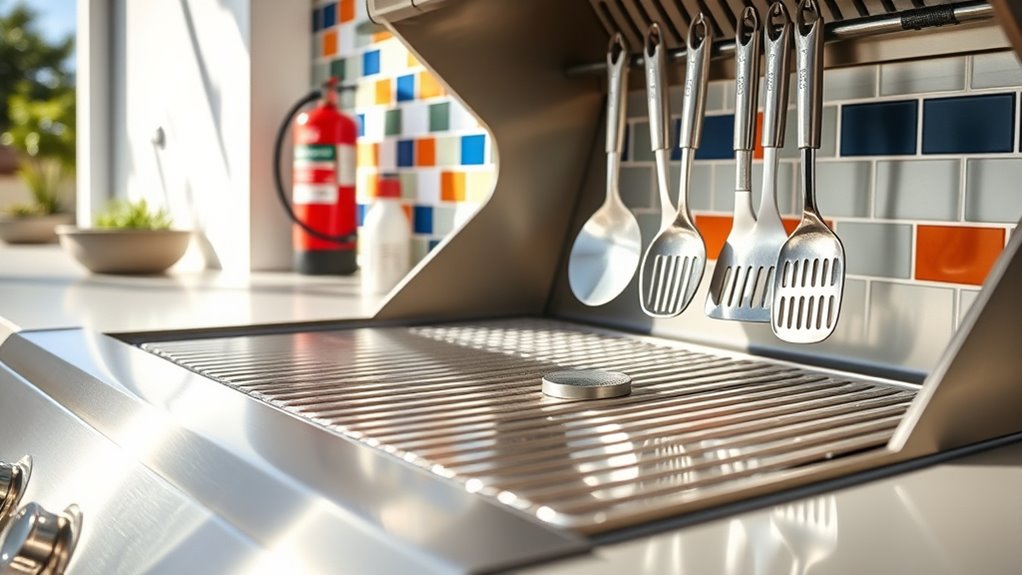
Keeping your grilling area clean is essential for safety and efficiency. Regularly sanitize the grill surface to prevent foodborne illnesses and ensure proper cooking. Before and after grilling, scrub the surface to remove grease, residue, and debris. Proper utensil organization also plays a crucial role; keep tools like spatulas and tongs clean and within reach to avoid cross-contamination. Clear the area of any clutter or flammable materials that could pose hazards. A tidy workspace reduces the risk of accidents and helps you focus on safe grilling practices. Additionally, cleaning as you go prevents buildup that could ignite or cause flare-ups. Stay vigilant with grill surface sanitation and utensil organization to create a safer, more enjoyable grilling experience. Make sure to check your equipment regularly for any cleaning and maintenance needs to keep it functioning safely and efficiently.
Never Leave the Grill Unattended
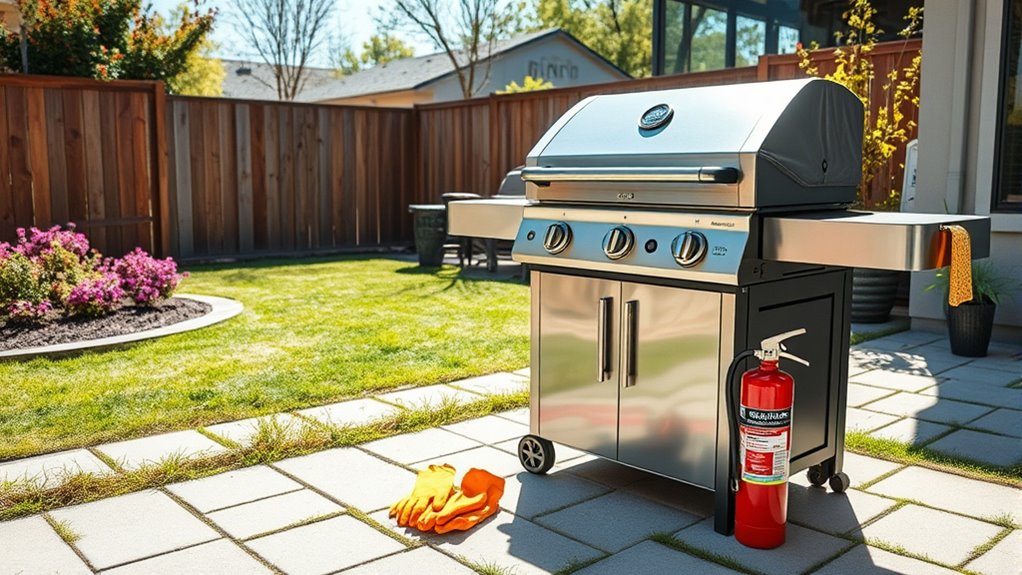
A clean grilling area sets the stage for safe cooking, but staying attentive during the process is equally important. Never leaving the grill unattended can prevent accidents and flare-ups. Use supervision tips like setting a timer to remind you to check on the grill frequently. Keep children and pets away, reducing distraction avoidance risks. Stay focused on the task, avoiding multitasking that can divert your attention. Always keep a spray bottle or fire extinguisher nearby for quick response. Remember, even a moment of distraction can lead to dangerous flare-ups or fires. Your vigilance ensures safe grilling and a more enjoyable experience. Consistent supervision is your best defense against potential hazards, so stay alert and keep your focus on your grill at all times. Additionally, understanding how heat pump features contribute to overall system safety can help prevent mechanical issues that might cause hazards.
Manage and Control Flare-Ups Swiftly
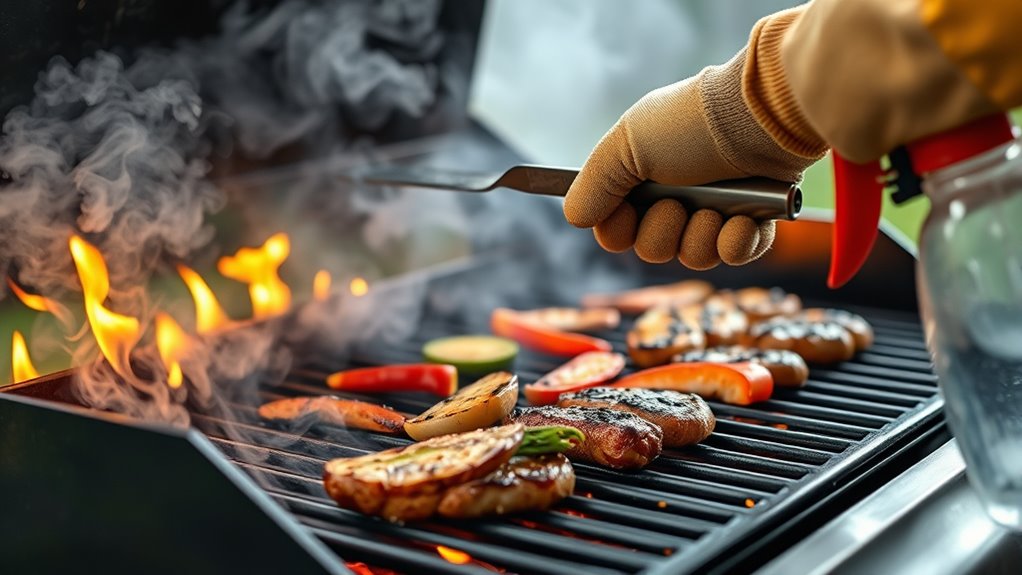
When flare-ups occur, responding quickly can prevent small fires from spiraling out of control. Grill flare-ups happen when fat drips onto the heat source, causing flames that can quickly get out of hand. To manage them, stay calm and keep a spray bottle of water nearby to douse minor flames safely. Use fire control techniques like closing the lid or turning off the burners to cut off the oxygen feeding the flames. If flames grow larger, have a fire extinguisher ready and know how to use it. Don’t try to move the food during a flare-up, as this can spread flames. Acting swiftly and confidently helps keep the fire contained, ensuring your grilling remains safe and enjoyable.
Keep a Fire Extinguisher Nearby
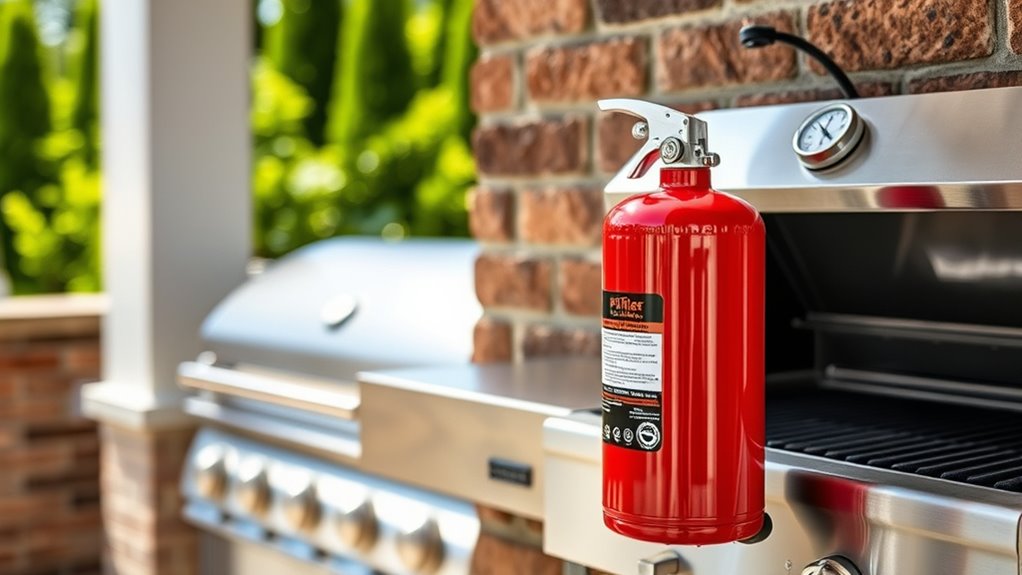
Having a fire extinguisher nearby is indispensable for quickly putting out grill flare-ups before they escalate. Ensure your extinguisher is easily accessible and properly placed, ideally within arm’s reach of your grilling area. Regular fire extinguisher inspection is essential; check pressure gauges, seals, and expiry dates to guarantee it’s ready when needed. Proper extinguisher placement helps you respond swiftly without fumbling or searching. Remember to keep the extinguisher upright and free from obstructions. Training everyone involved on how to use it effectively enhances safety. Having this small but critical safety tool nearby minimizes fire risks and prevents minor flare-ups from turning into major fires. It’s a simple step that can make a significant difference during your grilling sessions.
Properly Handle and Store Charcoal or Propane
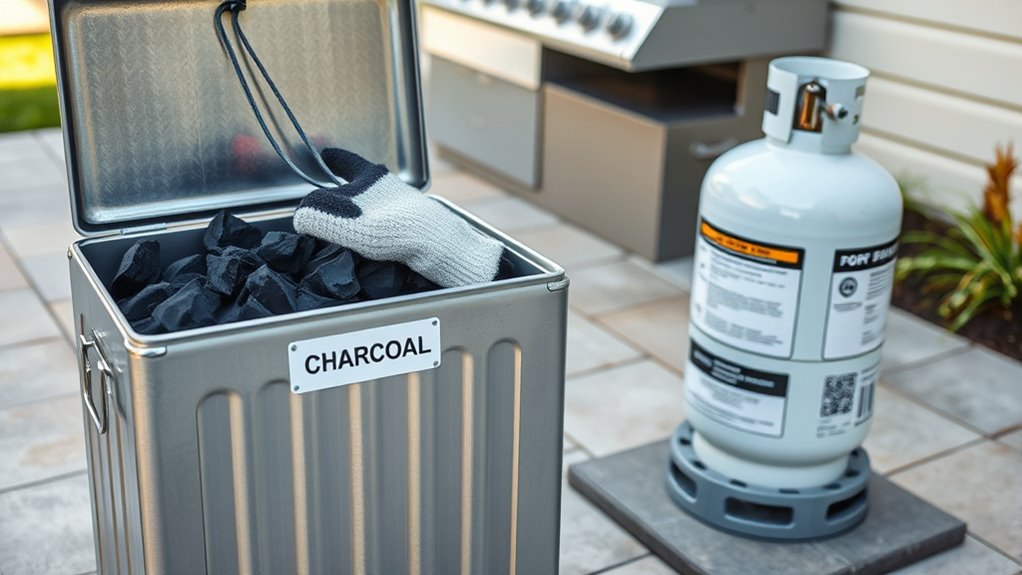
To prevent accidents, always handle and store charcoal and propane with care and attention. Proper charcoal storage means keeping it in a cool, dry place away from heat sources and out of children’s reach. Never store charcoal in airtight containers that could trap fumes. When it comes to propane handling, ensure tanks are upright and in well-ventilated areas. Check hoses and connections regularly for leaks, and never use a tank that’s damaged or rusty. Always shut off valves when not in use. Keep propane tanks away from open flames or heat sources, and transport them securely. Proper handling and storage reduce the risk of fires or explosions, keeping you and your loved ones safe during grilling.
Frequently Asked Questions
How Can I Prevent Cross-Contamination During Grilling?
To prevent cross-contamination during grilling, you should follow proper food safety and hygiene practices. Always use separate utensils and plates for raw and cooked foods, and wash your hands thoroughly before handling different items. Keep raw meats on a different side of the grill, and clean surfaces regularly. These small steps help maintain hygiene practices and ensure your food remains safe to eat, reducing the risk of foodborne illness.
What’s the Best Way to Check for Gas Leaks?
To check for gas leaks, you should use a soap solution and a gas detector. First, turn on the gas supply and apply the soap solution to all connections and hoses. Watch for bubbles, which indicate leaks. For added safety, use a gas detector around the grill to sense any escaping gas. Always perform these checks before igniting the grill to prevent potential hazards.
How Often Should I Replace Grill Parts for Safety?
You should replace grill parts during regular safety inspections, typically every season or after about 50-100 uses. Investigate the idea that grill maintenance isn’t essential—it’s not true. Regularly checking and replacing worn-out parts like hoses, burners, and valves helps prevent accidents. By staying proactive with safety inspections, you ensure your grill remains safe, efficient, and ready to cook. Don’t wait for problems—maintain your grill consistently for peace of mind.
What Are Signs of a Dangerous Flare-Up?
You’ll notice a dangerous flare-up when flames suddenly grow taller or turn orange and aggressive, often caused by excess fat, grease, or marinades dripping onto the heat source. To handle it safely, keep a spray bottle of water nearby, move the food away, and close the lid if needed. Recognizing flare-up causes and acting quickly helps prevent fires and keeps your grilling safe.
How Do I Store Leftover Charcoal Safely?
You need to store leftover charcoal safely to prevent accidents. First, let it cool completely, then transfer it to a metal container with a tight lid—never leave it in the bag or in combustible materials. Proper charcoal storage guarantees safe handling and reduces fire risks. Keep the container in a cool, dry place away from any heat sources or flammable objects, and always handle it with care.
Conclusion
By making these small safety tweaks, you’re already ahead of potential disasters. But what if one overlooked detail could mean the difference between a perfect cookout and a dangerous accident? Stay vigilant, keep safety top of mind, and remember: sometimes, the smallest change can have the biggest impact. Are you truly prepared to respond if something unexpected sparks? Your next safe, enjoyable grill depends on the choices you make today.
Susannah expertise lies in researching and compiling evidence-based content on juicing, nutrition, and overall health. She is committed to ensuring that The Juicery World offers accurate, up-to-date, and trustworthy information to empower readers to take control of their health. Susannah’s goal is to inspire individuals to embrace juicing as a way to nourish their bodies and live their best lives.


